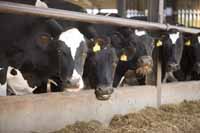Agency objection makes Nocton planning more difficult

Environment Agency comments on the Nocton super dairy and its potential to pollute water courses, will make the planning process more difficult, one of the men behind the venture has admitted.
The agency lodged a formal objection with planners stating that the 3770-cow unit in Lincolnshire would pose an unacceptable risk of pollution. Speaking to Farmers Weekly at the Semex conference in Glasgow on Tuesday 18 January, Nocton Dairies director Peter Willes said the objection would hinder plans.
“We’re looking to address the agency’s objection as with any consultees – either we’ll be able to address them or not.” But he said such feedback was a natural part of the consultation process. “We’ll leave our planning team to provide the agency with the information they are requesting and give a response to their concerns.”
The initial plan has already be revised, partly in response to environmental concerns. As a result the current planning request includes a number of improvements, Mr Willes said. “We are confident the work has been done to address environmental risks,” he said.
If granted, the site will now include an anaerobic digester from the word go, creating less smell and reducing pathogens. Digestate lagoons will also be located on farm, rather than on a series of off-farm sites as outlined initially.
Earlier at the Glasgow conference Mr Willes told delegates that he was still hoping to achieve Nocton Dairies’ original target of an 8100-cow unit.
He said expanding to 8100 cows would depend on the success of the first unit, but he had every confidence the proposed downsized “super dairy” would work well if allowed by planners.
Laying out the farm’s plans, Mr Willes demonstrated how the proposed positioning of the 80-point rotary parlour would allow for the building setup to be mirrored on the adjacent side.
Mr Willes would not commit over alternative plans if the unit was rejected and jokingly said: “We’ve already bought the farm. It’s in an arable rotation, so if wheat prices remain high we could always do that.”
Mr Willes and business partner David Barnes have also come under pressure from some smaller dairy farms, worried they will be unable to compete. But Mr Willes said a national milk shortage created a need for milk.
“Britain is becoming a bigger and bigger importer of dairy products. We have lost half of our dairy farmers and as a result production has dropped.”
Following a question from Mansel Raymond, NFU dairy board chairman, over whether they had received resistance from milk buyers, Mr Willes stressed they would not be planning a dairy where the milk was not wanted.
“Once we’ve built the unit, retailers will be invited so they can see exactly what we are doing and then make their decision. It’s rubbish that we already have a retailer lined up and a contract secured.”
